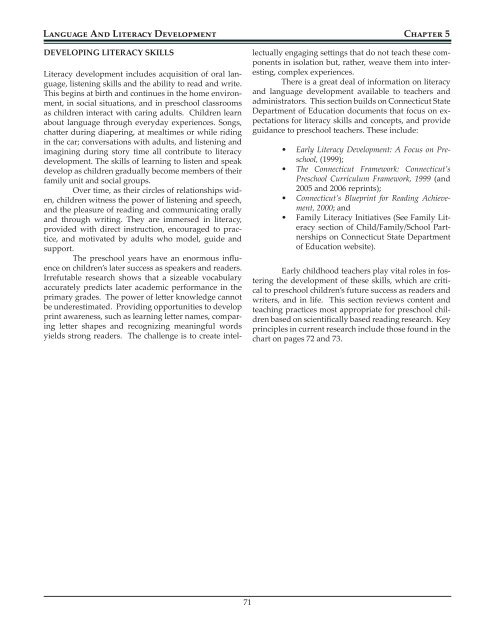Early Childhood
Early Childhood
Early Childhood
Create successful ePaper yourself
Turn your PDF publications into a flip-book with our unique Google optimized e-Paper software.
Language And Literacy Development Chapter 5<br />
DEVELOPING LITERACY SKILLS<br />
Literacy development includes acquisition of oral language,<br />
listening skills and the ability to read and write.<br />
This begins at birth and continues in the home environment,<br />
in social situations, and in preschool classrooms<br />
as children interact with caring adults. Children learn<br />
about language through everyday experiences. Songs,<br />
chatter during diapering, at mealtimes or while riding<br />
in the car; conversations with adults, and listening and<br />
imagining during story time all contribute to literacy<br />
development. The skills of learning to listen and speak<br />
develop as children gradually become members of their<br />
family unit and social groups.<br />
Over time, as their circles of relationships widen,<br />
children witness the power of listening and speech,<br />
and the pleasure of reading and communicating orally<br />
and through writing. They are immersed in literacy,<br />
provided with direct instruction, encouraged to practice,<br />
and motivated by adults who model, guide and<br />
support.<br />
The preschool years have an enormous influence<br />
on children’s later success as speakers and readers.<br />
Irrefutable research shows that a sizeable vocabulary<br />
accurately predicts later academic performance in the<br />
primary grades. The power of letter knowledge cannot<br />
be underestimated. Providing opportunities to develop<br />
print awareness, such as learning letter names, comparing<br />
letter shapes and recognizing meaningful words<br />
yields strong readers. The challenge is to create intel-<br />
71<br />
lectually engaging settings that do not teach these components<br />
in isolation but, rather, weave them into interesting,<br />
complex experiences.<br />
There is a great deal of information on literacy<br />
and language development available to teachers and<br />
administrators. This section builds on Connecticut State<br />
Department of Education documents that focus on expectations<br />
for literacy skills and concepts, and provide<br />
guidance to preschool teachers. These include:<br />
• <strong>Early</strong> Literacy Development: A Focus on Preschool,<br />
(1999);<br />
• The Connecticut Framework: Connecticut’s<br />
Preschool Curriculum Framework, 1999 (and<br />
2005 and 2006 reprints);<br />
• Connecticut’s Blueprint for Reading Achievement,<br />
2000; and<br />
• Family Literacy Initiatives (See Family Literacy<br />
section of Child/Family/School Partnerships<br />
on Connecticut State Department<br />
of Education website).<br />
<strong>Early</strong> childhood teachers play vital roles in fostering<br />
the development of these skills, which are critical<br />
to preschool children’s future success as readers and<br />
writers, and in life. This section reviews content and<br />
teaching practices most appropriate for preschool children<br />
based on scientifically based reading research. Key<br />
principles in current research include those found in the<br />
chart on pages 72 and 73.


